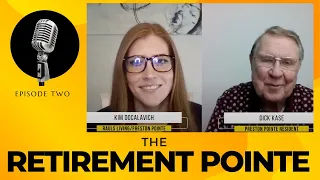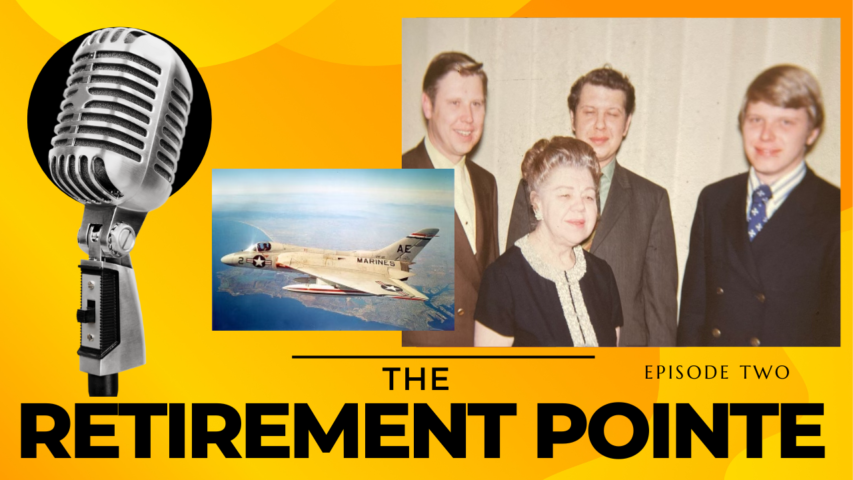
The Retirement Pointe Podcast – Episode Three w/Gerri Barbour
April 1, 2024
The Retirement Pointe Podcast – Episode One w/Larry Smith
April 4, 2024The Retirement Pointe Podcast – Episode Two w/Dick Kase

On episode two of The Retirement Pointe Podcast, Kim Docalovich speaks with resident Dick Kase about his military career, the worldwide trip of a lifetime, and the adventures he's had after reaching the "retirement pointe".
Video Transcription:
Hi there. Welcome to the Retirement Point Podcast, where we talk to seniors about their lives, share their stories, and their journey to retirement.
Today, we have an exciting guest who has an extensive career in aviation and an incredible passion for travel. Welcome to the Retirement Pointe podcast. How are you today?
Welcome I'm fine. I wake up every morning. I got to be fine at my age.
I'm very glad that you're joining us today. And I'm very excited to be able to share your story. Let's get into it. Tell me a little bit about your childhood. Where did you grow up?
I was born in 1938 and my mom and dad bought a new home in Northwest Detroit. For about 6, 000 and it was like top of the line there. And I grew up in that neighborhood for 20 years. I have two brothers, one of them who passed away early.
He was 55, Mike. My, and my youngest brother, Roland. Is still living in Detroit. What was your daily life like then? We would start at eight o'clock in the morning with I'm Catholic, so it was mass. And I spent eight years in, in the grade school and went on to high school in which was only a mile and a half away from the house.
Everything was in, in those days, walking distance. If I was lazy, it cost me 10 cents to ride the bus to school. But no, normally I'd walk because there was a coffee shop and we'd stop and have coffee on the way. Do you go to college after graduating high school? I got accepted in the university of Detroit for one semester, which I was not a good student.
And It just didn't work out, so I ended up working full time in a grocery store. Which was not my thing. I was not doing well at home, things were not My mom raised three boys, and she had no idea because she had two sisters. So At any rate I ended up joining in the Marine Corps, enlisting in the Marine Corps. That sounds interesting. Tell us a little more about that. Spent about two years as an enlisted man and they, at the point where I was after camp they told me that my GCT, general classification test was high enough that I could.apply for flight training which I did. And it took about a year and a half later after I left San Diego comm school and was selected for the Marquette program at the time it was Vietnam was in full swing and they were short of aviators and At that point, I I ended up going to Pensacola, Florida for flight training and of course, 16 weeks of more bootcamp, if you will along with I went through flight training.
I started in January of 61, which is an interesting story. I was backing up into December of 60. I was in town one evening after Christmas and I got home and they said where have you been? Because they're looking for you. And I'm going like, I don't know anything about this. I went up to the communication center and they showed me. a letter from headquarters Marine Corps that said, you have been selected to the MARCAD program. I thought they were kidding me because they knew I, I had applied for it. At any rate I ended up going through flight training January of 61. And I got my wings and commission as a second lieutenant in November. of 62.
Did you know you wanted to fly jets?
I at that time all my classmates, my pre flight classmates, ended up going to helicopters and the two month separation gave me the opportunity and they were not looking for helicopter pilots, gave me the opportunity to go to advanced flight training in jets. So I ended up in Texas going through the jet program. And as I say in November, I got my wings and commissioned a second lieutenant.
Where was your first assignment?
I ended up being assigned to Cherry Point here in North Carolina and was assigned to Marine Fighter Squadron, all weather 115, which is still in existence today, and it's got quite a history going back to World War II and up through today. It has been, it transitioned into Vietnam about six or seven times over the Vietnam period. So it had a lot of history. Unfortunately, By the time I got to Vietnam I was not assigned to a flight squadron. I got some other additional duties to perform.
So tell me why you chose the Marine Corps over some of the other branches.
Oh I don't know. To this day, I still wonder what made me choose the Marine Corps. I knew I didn't want to go in the Army. That I knew for sure. The Navy was questionable. But at any rate, I don't know. It was the Marine Corps all the way. And so I enlisted, and of course, much to the chagrin of my mom.
I'm sure.
She was not happy. to say the least. At any rate, after I got my wings and got to Cherry Point, my brother, Mike, who was three years younger than I was, decided he wanted to try and go to flight training. So he enlisted in the Marine Corps. Unfortunately, he was colorblind and never, never thought about it. But At that time, colorblindness was disqualifying in the flight program. So he ended up spending let's see he went through electronic school was assigned, trying to remember, we weren't together, but he, I guess he went to Okinawa. And he joined a transport squadron. It was repaired the electronics on the airplanes. And we did get together one time and he, because the squadron flew into Vietnam, into to our location, he came in on the airplane and we got to spend a day and a half together before he had to fly back to Okinawa. I lost him. I'm sorry. When he was 55 years old. That was wow, that was a long time ago. It was 19, he was born in 41, so it was 96 or 97 that we lost him. So it's been, a good time and I still miss him. We thought alike and so at any rate we, we didn't get to see a whole lot during our military career. And after I came home from Vietnam, which was in 68, I I started looking for a job, ended up I was selected by Burroughs Business Machines to be an instructor in their computer department, teaching other people how to repair computers.
And that required an elect, I I'm sorry That required a an an extensive mathematics background. When I went to the to apply for the job, they gave me a 40 question test and I forwarded the test because it was all math. Little did they know that their test was the same one that you took to apply for an airline job as a pilot.
So immediately they thought we've got somebody here. And they hired me on the spot, and I had to go through the program before before I started teaching. About two months into the program General Electric Company called me to interview for a flying job. At that time, they had six airplanes. Four and four. No, they had eight airplanes. And the interview consisted of, we're gonna, we're looking for somebody to fly out of the Boston location because Boston is the aircraft engine group headquarters and the flight was from Boston to Cincinnati five days a week. Was there a lot of training involved in going from a military plane to a commercial plane?
When I trained in the military, I was, I flew a jet. And so the part about flying a swept wing aircraft, as opposed the Gulfstream one was a straight wing aircraft and flying and transitioning all the flight characteristics, although you don't feel it when you're flying they're completely different because of the swept wings stall speeds are a little.A little bit higher. And there are a lot, a lot of other things. But the thing is mostly in when you get to the, those types of aircraft, the instrumentation is just sophisticated. And for whatever reason, the Gulf, actually the private airplanes, the, all the the gulf streams the jet streams, the, all instrumented, their aircraft, the left side was identical to the right side. So you could literally fly the airplane from either seat and see the same picture. Which the airlines, uh, they've finally gone to that period, but early in the airline industry's career. Only the captain had the sophisticated instruments. The first officer on the right hand side had lower class instrumentation. And my son, even even he flying the early aircraft they were different, but now with the triple seven and all those things that they have, they've. They've gone to, sophistication, if you will.
So when did you decide to retire?
The General Electric Company required us to follow airline rules in retirement. So I was required to retire at age 60. And they supplemented me until for a couple of years, two years. Um, until I reached 62 and was able to retire, under federal guidelines. If you want, we can switch gears a little bit because I know when we talked before, you talked a lot about your passion for travel.
So I know you did a lot of traveling, not only with the military, but also in your free time.
I did.
And one of those things helped me out. Was what you call the trip of a lifetime. And I'd love if you could share that with us.
Oh my gosh. I told you that way back, didn't I? You sure did. Oh, wow. Yeah. The trip of a lifetime was an around the world trip.
We started the flight started in New York and we picked it up in Anchorage, Alaska and because we had to refuel to make At any rate, from Japan, we went to China, but the the re, the Republic of China, not the Chinese not the mainland. And from there, I guess we did go to Hong Kong from there.
From Hong Kong, we went from Hong Kong, we went to India. Yeah, from India from Hong Kong to India, and we went to New Delhi and spent. Two or three days there. While we were there, we got to Agra and saw the Mahal. And then from there into into Saudi Arabia. Saudi Arabia, we flew, we continued on until we had to get out over the Mediterranean Ocean Mediterranean Sea to get into Jerusalem.
Because there were political implications by flying from one country. We ended up there and we had a tour while we were there for four days and we ended up having our own driver while we were there two days, he was assigned to us and he said, what do you want to do? And we said, we want to see as much of Israel as we can see in the allotted time.
And we started out, it was a little over two days, but we started out in Jerusalem, ended up going and following the path of Jesus Christ north along the along the Mediterranean and then into his birthplace, or not his birthplace, his home, where Joseph was a carpenter. And from there, We went to the Masada, which is just overlooking the Black Sea.
Now this was all done driving and so it was, it was not a short trip. Saw the wailing wall with all the notes that people posted in the in the wall and walked some of the trail that, that he carried the cross on.
That's quite the trip. What else did you do once you reached the retirement point?
I just did fun things, played a lot of golf, although I never broke, I think I broke 100 one time. Other than that, it was just to get on a golf course and beat the ball around the My wife and I, Faith, we purchased a camper, a 35 foot trailer and We toured to Florida for 16 years from the end of, from right after Christmas until the end of March or middle of April, depending on what, what we were going to do.
And we were going to travel all over the United States too. The one, one trip to the United States was a trip to Alaska. And we spent, we, we actually paid a company to, that took people around and you toured Alaska and saw all the sites and they provide all the entertainment and everything. And let's see, so we took part in that, it took us about six weeks, yeah about six or seven weeks that we traveled.
We put 13, 000 miles on the camper and the truck during the tour.
Can you give us one piece of advice to anyone younger who's listening?
I've seen a lot of the world and I wish people would, try to make a big effort to get out and see it because there are so many things that are different. And. You just have to roll with the punches.
Oh, I love that so much. Thank you so much for joining us, Mr. Kase. We really appreciate it. Oh, yeah. It was fun. I didn't think I could talk as long as I did. So You did. We got through a lot.
Oh. I'm glad. I'm glad. I just hope it turns out okay. so much.

